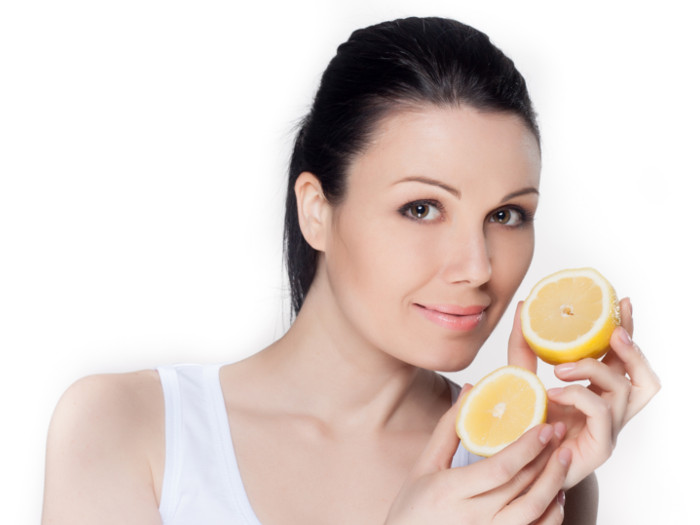Using lemon juice for skin health is an ancient technique and one that still holds true to this day all around the world.
Is Lemon Juice Good for Your Skin?
Lemon juice is one of the best natural treatments for the skin, as it possesses powerful antibacterial and antioxidant components. The active ingredients in lemon juice include citric acid, ascorbic acid, limonene, monoterpenes, Linalool, flavonoids, copper, iron, phosphorous, potassium, and calcium, among others. The citric acid and vitamins have can have a wide range of positive effects on the skin when used in moderation. Lemon juice can be used by itself, as a topical remedy, but other people choose to mix lemon juice with other carrier oils or skin-protecting ingredients for even greater effects. [1]
How to Use Lemon Juice for Skin?
Lemon juice can be used for the skin in many ways, including to reduce pimples, treat acne, reduce pigmentation problems, lighten freckles, prevent premature aging, and eliminate inflammation, among others.

Lemons, rich in vitamin C and citric acid, can help improve your skin health. Photo Credit: Shutterstock
Serving Size : Nutrient Value Water [g] 92.31 Energy 22 Energy [kJ] 91 Protein [g] 0.35 Total lipid (fat) [g] 0.24 Ash [g] 0.21 Carbohydrate, by difference [g] 6.9 Fiber, total dietary [g] 0.3 Sugars, total including NLEA [g] 2.52 Sucrose [g] 0.43 Glucose (dextrose) [g] 0.99 Fructose [g] 1.1 Calcium, Ca [mg] 6 Iron, Fe [mg] 0.08 Magnesium, Mg [mg] 6 Phosphorus, P [mg] 8 Potassium, K [mg] 103 Sodium, Na [mg] 1 Zinc, Zn [mg] 0.05 Copper, Cu [mg] 0.02 Manganese, Mn [mg] 0.01 Selenium, Se [µg] 0.1 Vitamin C, total ascorbic acid [mg] 38.7 Thiamin [mg] 0.02 Riboflavin [mg] 0.02 Niacin [mg] 0.09 Pantothenic acid [mg] 0.13 Vitamin B-6 [mg] 0.05 Folate, total [µg] 20 Folate, food [µg] 20 Folate, DFE [µg] 20 Choline, total [mg] 5.1 Carotene, beta [µg] 1 Cryptoxanthin, beta [µg] 4 Vitamin A, IU [IU] 6 Lutein + zeaxanthin [µg] 15 Vitamin E (alpha-tocopherol) [mg] 0.15 Fatty acids, total saturated [g] 0.04 10:0 [g] 0.02 12:0 [g] 0 14:0 [g] 0 15:0 [g] 0 16:0 [g] 0.01 18:0 [g] 0 Fatty acids, total monounsaturated [g] 0.01 14:1 [g] 0 18:1 [g] 0 18:1 c [g] 0 Fatty acids, total polyunsaturated [g] 0.02 18:2 [g] 0.01 18:2 n-6 c,c [g] 0.01 18:3 [g] 0.01 18:3 n-3 c,c,c (ALA) [g] 0.01 Sources include : USDA [2]
Pimples
Pimples and spots are often caused by blocked pores and are often exacerbated by bacteria. The exfoliating and antibacterial nature of this juice is excellent for eliminating bacteria and squeezing excess oil from the pores.
Pigmentation
If you have dark spots or blemishes on your skin, you can use lemon juice for its skin-lightening properties. Many people also use this juice to reduce the appearance of scars and other discoloration on various parts of their body.
Freckles
Although many people think that having freckles is endearing, applying lemon juice to these seasonal (or permanent) spots can make them less apparent on your face, helping them blend in with the normal pigmentation of your skin. [3]
Premature Aging
The antioxidants and other vitamins in lemon juice are able to neutralize free radicals, eliminate toxins in the skin, and prevent signs of premature aging by cutting down oxidative stress. This can also boost skin elasticity to keep you looking younger for longer. [4]
Inflammation
If you suffer from inflammatory conditions, from dandruff and psoriasis to eczema or rosacea, applying lemon juice can eliminate the itching and soothe irritation. [5]
Acne
Lemon juice can get rid of excess oil, neutralize bacteria in the pores, reduce redness, and stimulate healing in acne-affected areas of the skin. [6]
Side Effects of Using Lemon Juice on Skin
There are some side effects of using lemon juice for skin treatment, such as skin lightening, dry skin, and increased skin sensitivity to light.
Skin Lightening
While people with pigmentation issues may appreciate the skin-lightening properties of lemon juice, those with dark skin should avoid using lemon juice due to its skin-lightening effects. [7]
Dry Skin
The astringent nature of lemon juice can prevent your skin from being too oily, but if used in excess, can cause dry skin patches, as well as irritation and itching.
Sunlight Sensitivity
Some anecdotal evidence and research have found that lemon juice is able to make the skin more sensitive to sunlight and make you more prone to sunburns. [8]
